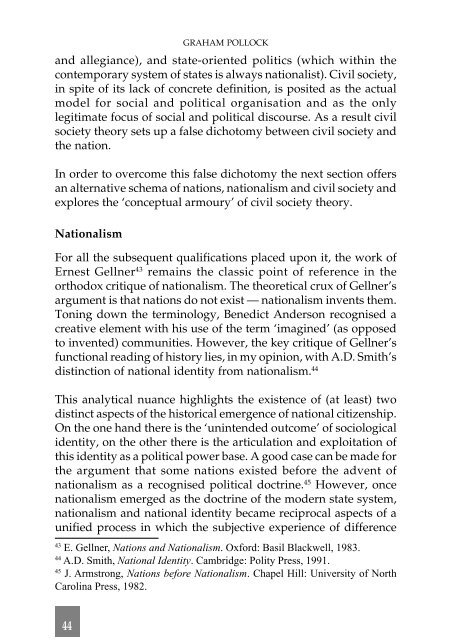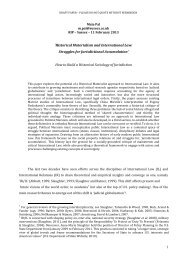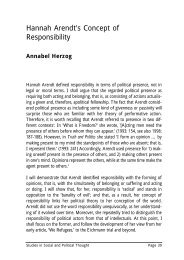Civil Society Theory and Euro-Nationalism - University of Sussex
Civil Society Theory and Euro-Nationalism - University of Sussex
Civil Society Theory and Euro-Nationalism - University of Sussex
You also want an ePaper? Increase the reach of your titles
YUMPU automatically turns print PDFs into web optimized ePapers that Google loves.
44<br />
GRAHAM POLLOCK<br />
<strong>and</strong> allegiance), <strong>and</strong> state-oriented politics (which within the<br />
contemporary system <strong>of</strong> states is always nationalist). <strong>Civil</strong> society,<br />
in spite <strong>of</strong> its lack <strong>of</strong> concrete definition, is posited as the actual<br />
model for social <strong>and</strong> political organisation <strong>and</strong> as the only<br />
legitimate focus <strong>of</strong> social <strong>and</strong> political discourse. As a result civil<br />
society theory sets up a false dichotomy between civil society <strong>and</strong><br />
the nation.<br />
In order to overcome this false dichotomy the next section <strong>of</strong>fers<br />
an alternative schema <strong>of</strong> nations, nationalism <strong>and</strong> civil society <strong>and</strong><br />
explores the ‘conceptual armoury’ <strong>of</strong> civil society theory.<br />
<strong>Nationalism</strong><br />
For all the subsequent qualifications placed upon it, the work <strong>of</strong><br />
Ernest Gellner 43 remains the classic point <strong>of</strong> reference in the<br />
orthodox critique <strong>of</strong> nationalism. The theoretical crux <strong>of</strong> Gellner’s<br />
argument is that nations do not exist — nationalism invents them.<br />
Toning down the terminology, Benedict Anderson recognised a<br />
creative element with his use <strong>of</strong> the term ‘imagined’ (as opposed<br />
to invented) communities. However, the key critique <strong>of</strong> Gellner’s<br />
functional reading <strong>of</strong> history lies, in my opinion, with A.D. Smith’s<br />
distinction <strong>of</strong> national identity from nationalism. 44<br />
This analytical nuance highlights the existence <strong>of</strong> (at least) two<br />
distinct aspects <strong>of</strong> the historical emergence <strong>of</strong> national citizenship.<br />
On the one h<strong>and</strong> there is the ‘unintended outcome’ <strong>of</strong> sociological<br />
identity, on the other there is the articulation <strong>and</strong> exploitation <strong>of</strong><br />
this identity as a political power base. A good case can be made for<br />
the argument that some nations existed before the advent <strong>of</strong><br />
nationalism as a recognised political doctrine. 45 However, once<br />
nationalism emerged as the doctrine <strong>of</strong> the modern state system,<br />
nationalism <strong>and</strong> national identity became reciprocal aspects <strong>of</strong> a<br />
unified process in which the subjective experience <strong>of</strong> difference<br />
43 E. Gellner, Nations <strong>and</strong> <strong>Nationalism</strong>. Oxford: Basil Blackwell, 1983.<br />
44 A.D. Smith, National Identity. Cambridge: Polity Press, 1991.<br />
45 J. Armstrong, Nations before <strong>Nationalism</strong>. Chapel Hill: <strong>University</strong> <strong>of</strong> North<br />
Carolina Press, 1982.
















